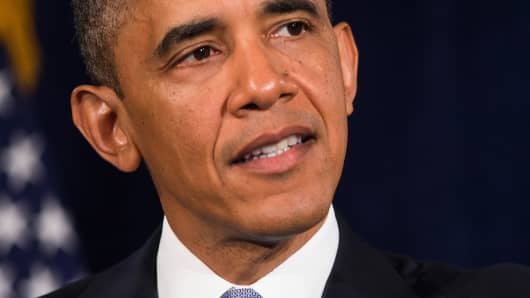Amid a fresh assault from opponents, President Barack Obama Thursday plans to demonstrate that his landmark health-care reform law is moving from being an "abstraction" to a program that delivers benefits to "real people," officials said.
Obama is set to give a White House speech in which he is expected to boast how the Affordable Care Act already is giving 8.5 million Americans an average rebate of about $100 per family this summer, just months before new insurance mandates on individuals take effect.
The speech comes after House Republicans late Wednesday approved largely symbolic legislation to delay key coverage requirements. The measures were the 38th and 39th House bills to take aim at the 2010 reforms known as Obamacare, and were aimed at delaying the insurance mandates for individuals, which begin next year.
(Read More: House Republicans vote to delay Obamacare mandates)
The opposition was recently bolstered by the Obama administration's decision to delay the mandate for larger employers to offer health coverage. That step raised questions about whether it is possible for the individual requirements to take effect as scheduled.
Obama — whose signature legislation remains a political flash point three years after becoming law — also is expected to crow at Thursday's event about how Obamacare policies also helped nearly 78 million consumers save about $3.4 billion in insurance premiums in 2012.
(Read More: This could put Obamacare in the ER )
The $500 million or so in rebates are related, Obama administration officials said, to the ACA rule that compels insurers to give customers money back if they fail to spend at least 80 percent of premium dollars on medical care and heath-care quality improvement, as opposed to administrative costs.
That new rule, and other ACA provisions, also lead to the reduced premiums, according to officials, who said some rebate recipients will appear with Obama at his speech.
Cheaper premiums
In related news, the U.S. Health and Human Services Administration on Thursday is releasing data suggesting that some premiums of medium-priced plans that are going on sale in 11 new state insurance exchanges in October are significantly less expensive than had been estimated by the Congressional Budget Office when the law was passed in 2010.





